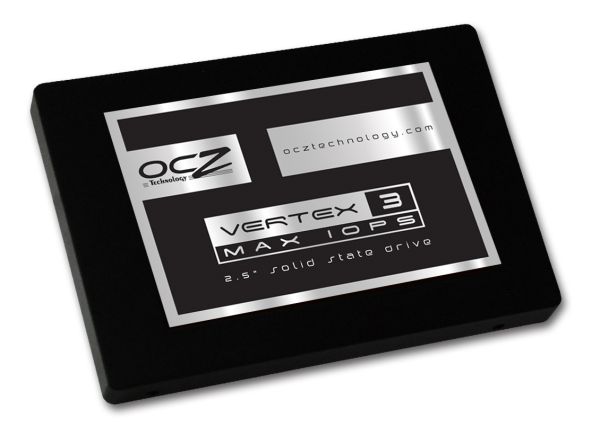This Just In: OCZ's Vertex 3 MAX IOPS 120GB, The New Mid-Range King?
by Anand Lal Shimpi on June 15, 2011 5:53 PM ESTI mentioned in our Mid-Range SSD Roundup that most SSD vendors like sampling the best balance of capacity/performance when it comes to SSD review samples. For the SandForce SF-2281 with 25nm NAND that just happens to be 240GB. Unfortunately there's a pretty big fall off in performance when going from 240GB to 120GB due to the decrease in total number of NAND die (8GB per die x 32 die vs. 16 die). I've explained this all before here.
Enter OCZ's MAX IOPS drive. Using 32nm Toshiba Toggle NAND instead of 25nm IMFT ONFI 2.x NAND the die capacity drops to 4GB, which means you get twice as many die per NAND device. The end result? 240GB Vertex 3 performance for slightly more than 120GB Vertex 3 pricing.
I ordered the 120GB MAX IOPS drive at the beginning of the week and just got it in yesterday so I've only had a small amount of time to test with it thus far. Check out the 120GB MAX IOPS drive vs. the Intel SSD 510 in Bench using our 2011 storage test suite. Expect the full review in the coming days.











107 Comments
View All Comments
shadowofthesun - Wednesday, June 15, 2011 - link
Damn... I picked up the vanilla 120G Vertex 3 for my new build instead of the MAX IOPS edition about a month ago. I wish I had seen this first- I had thought the MAX IOPS edition was just a firmware tweak.Zap - Thursday, June 16, 2011 - link
"I ordered the 120GB MAX IOPS drive at the beginning of the week and just got it in yesterday"Anand, does this mean OCZ wouldn't send you one for review?
Griswold - Thursday, June 16, 2011 - link
Companies like OCZ need to get through a full year without firmware horror and reliability issues before they can be considered by people who do more than just play benchmarks.So far, only Intel and Samsung seem to be able to deliver that. The rest is just good for benchmarking...
Beenthere - Thursday, June 16, 2011 - link
I agree if a SSD isn't highly reliable then it is not welcome in any of my PCs. I'm not interested in constant firmware, driver updates and BSOD. Don't ship the product until it's sorted out properly. An SSD is worthless to me if it is not fully reliable.L. - Friday, June 17, 2011 - link
99% reliable might justify the price/performance ratio . Don't forget it's not 'all drives fail in all conditions' . it's more like 1% of drives fail in almost known conditions.Meh ;. if software was that reliable I'd be happy tbh.
7Enigma - Thursday, June 16, 2011 - link
That is definitely my opinion as well. My friend recently (last couple months) purchased a SSD for his Sager laptop and ended up going with an Intel G2 160GB drive. At the time the Vertex 2 and C300 were the kings of performance, but of very questionable reliability. He chose the Intel specifically because it was a validated product.Movieman420 - Thursday, June 16, 2011 - link
From Ocz website:'Unlike other brands OCZ does not use a reference design, and we design and manufacture our SSDs in-house, and are NOT affected by the hardware problems which are unique to other drive vendors.'
They use their own proprietary design...Corsair uses a SF reference design, or is trying to.
Beenthere - Thursday, June 16, 2011 - link
Agreed that OCZ is not using the reference design but they definitely have firmware issues. That's why I said that there are many unacceptable issues with SSDs at this time. IMO it's unscrupulous to ship these products without being 100% certain they perform as advertised and are reliable.geddarkstorm - Thursday, June 16, 2011 - link
No piece of hardware is 100% reliable, hate to say it. A 1% problem rate is really high, but who is to say it is their hardware alone that is the problem and not the operating system. Even Windows 7 is optimized for spinning platter based disks, and how to manage their power and work load, not for an SSD. All it takes is one bad Windows update (or combination of) or a corrupt driver to throw everything out of whack. If you've ever played with Linux and all the hardware fun that involves, you should understand what I'm saying.Beenthere - Thursday, June 16, 2011 - link
They have been able to duplicate the issues at OCZ, Corsair and SandForce. They just haven't identified all the conditions and stimuli for the operational issues. Operational issues are one matter but reliability is a whole nother matter. If an SSD doesn't perform properly or isn't reliable it's of no value to me and is in fact an expensive headache.